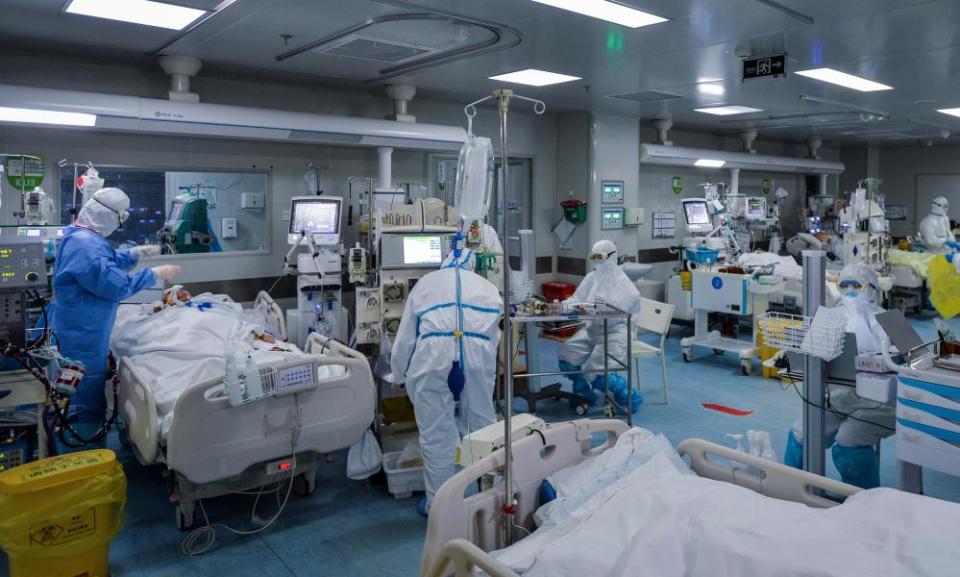Wuhan doctor: China authorities stopped me sounding alarm on Covid

A doctor from the Wuhan hospital hit hardest by the Covid-19 epidemic has said he and colleagues suspected the virus was highly transmissible in early January last year, weeks before Chinese authorities admitted it, but were prevented from warning anyone.
The doctor’s testimony – in a new BBC documentary on the 54 days between the first known case of coronavirus and the Wuhan lockdown – adds to mounting evidence of Beijing’s early attempts to cover up the virus outbreak, and intimidate healthworkers into staying quiet.
Wuhan central hospital is just a few kilometres from the Huanan wet market, the epicentre of the coronavirus outbreak, and was quickly overwhelmed by patients after the first cases emerged in December 2019. More than 200 hospital employees reportedly contracted the virus, and several, including whistleblower doctor Li Wenliang, died.
Watch: One year after Wuhan: 'How Beijing recast Covid as a victory'
Related: 76 Days review – harrowing account of the incubation of the coronavirus
The hospital’s respiratory department was full by 10 January, the unnamed doctor told the BBC for its programme, 54 Days. “It was out of control, we started to panic,” he said.
But hospital authorities banned them from speaking to anyone, and wouldn’t allow them to wear masks, he said. “Everyone knew it was human-to-human transmission, even a fool would know. So why say there was none? This made us very confused and very angry.”
The doctor said within weeks there were hundreds or thousands of suspected cases but they had no means of confirming or reporting a diagnosis within the hospital structure. Just 41 cases had been officially reported by that time.
Previous reporting has revealed Beijing’s leadership was aware of a likely pandemic for at least six days while telling the public it was low risk, before it eventually warned of human-to-human transmission on 20 January. Authorities were also accused of preventing the release of genomic sequencing results for several days, until professor Zhang Yongzhen published his online, against strict orders.
American virologist Ian Lipkin told the BBC he was contacted by the head of the Chinese Center for Disease Control and Prevention (CDC), George Gao, around the new year, as rumours of the virus began to circulate. Lipkin said Gao told him they had identified the virus and it was not highly transmissible.
Related: 'Hero who told the truth': Chinese rage over coronavirus death of whistleblower doctor
“I don’t think he was duplicitous. I think he was just wrong,” said Lipkin. “He should have released some sequences and said this is what we know.”
Gao, who declined to be interviewed, has told state media sequences were released as quickly as possible and that he never said there was no human-to-human transmission.
By the time Wuhan went into lockdown on 23 January, the Wuhan central hospital was receiving 2,500 cases a day.
“There were some patients who didn’t need to die. There was nothing we could do, the medical resources were just too tight at that time,” said the doctor. “I believe the true history needs to be remembered. We need to learn the lessons so that this doesn’t happen again.”
China has insisted it quickly released all relevant information and has denied all accusations of a cover-up.
Professor Laurence Gostin, director of the World Health Organization (WHO) collaborating centre on health law at Georgetown university, said China’s failure to report the existence of the virus was a violation of international health regulations, and mirrored the cover-up conducted during the 2003 Sars epidemic.
“The country has an obligation to answer WHO’s questions honestly fully and transparently and I don’t think that happened entirely,” said Gostin.
The BBC documentary also examined the response of the WHO, which continued to publicly stand by China’s assurances that there was no evidence of human-to-human transmission even while experts internally believed otherwise and were briefing world leaders to prepare.
Watch: WHO team arrives in Wuhan to trace the origins of COVID-19
Leaked audio from inside WHO meetings – obtained by the Associated Press and broadcast by the BBC – revealed WHO officials discussing the similarity of the situation with the Sars outbreak and “endlessly trying to get updates from China”, and the danger of “finger pointing” if something were to happen.
“[To say] there is no evidence of human-to-human transmission is not good enough. We need to see the data, we need to be able to determine for ourselves the geographic distribution, the timeline, all of that,” WHO’s emergencies head Michael Ryan said at one early January meeting.
The following day, WHO officials again praised China’s response.
Now, Chinese authorities are battling the country’s worst outbreak since early 2020, albeit in far smaller numbers, and a mission of WHO scientists is in Wuhan, completing quarantine before it can start long-awaited investigation into the origins of the virus. While those on the team have stressed it is not about apportioning blame, there are already concerns about whether China will give them the access required, amid a concerted effort by Beijing to rewrite the narrative of the virus’s origins.
The documentary airs on BBC 2 on Tuesday. It is the first of a two-part series, with the second episode focusing on the US response to the pandemic.

 Yahoo Finance
Yahoo Finance 